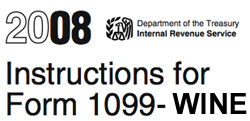Does wine still merit a sin tax?
 While we were all out during the holidays, a fascinating piece by David Leonhardt about tax and wine ran in the business section of the Times. He met with Philip Cook, a Duke economist and Yellow Tail lover, who argues in his book that wine is getting a free ride from a tax perspective. The federal excise tax on wine has stayed level at $1.07 a gallon (about $0.21 a bottle, a tax that must be paid before the wine leaves the winery) since 1992. So Cook argues that we are “subsidizing” wine since the real tax rate has fallen by 33% in that time. He advocates doubling the excise tax on wine and alcohol since he says that the tax doesn’t cover the “costs” of alcohol on society. Here’s the way Leonhardt sums it up:
While we were all out during the holidays, a fascinating piece by David Leonhardt about tax and wine ran in the business section of the Times. He met with Philip Cook, a Duke economist and Yellow Tail lover, who argues in his book that wine is getting a free ride from a tax perspective. The federal excise tax on wine has stayed level at $1.07 a gallon (about $0.21 a bottle, a tax that must be paid before the wine leaves the winery) since 1992. So Cook argues that we are “subsidizing” wine since the real tax rate has fallen by 33% in that time. He advocates doubling the excise tax on wine and alcohol since he says that the tax doesn’t cover the “costs” of alcohol on society. Here’s the way Leonhardt sums it up:
And for all that is wonderful about wine, beer and liquor, they clearly bring some heavy costs. Right now, the patchwork of alcohol taxes isn’t coming close to covering those costs — the costs of drunken-driving checkpoints, of hospital bills for alcohol-related accidents and child abuse, and of the economic loss caused by death and injury. Last year, some 17,000 Americans, or almost 50 a day, died in alcohol-related car accidents. An additional 65,000 people a year die from other accidents, assaults or illnesses in which alcohol plays a major role.
Wine has ethyl alcohol in it so it contributes to these statistics. But the argument has floated around for centuries that wine is consumed differently than beer and spirits. Since at least the time of Thomas Jefferson, wine has had advocates who see wine as a drink of moderation since it is mostly consumed with food.
Further, since about 1991 when “60 Minutes” popularized the notion of the “French paradox,” there have been many studies underscoring the health benefits of wine, particularly the role of tannins. Heck, resveratrol extends life and promises fat-free gluttony!
So what do you say, does wine still deserve a sin tax? Of course, Cook does not take into account the fact that wine geeks already have been paying a “tax” called the declining dollar. Sobering indeed.
And if we’re opening the discussion of taxes and wine, there’s always the environmental cost of the wine industry in the form of greenhouse gases. A carbon tax, perhaps?




On January 10th, 2008 at 5:06 pm ,stephen cloughley wrote:
I defer to former Senator Patrick Daniel Moynihan who opined that our nation has a tendency to see complex things very simplistically. The tragedy of addiction, DUI and other malign effects is not simply the fault of the wine producer and consumer. So a financial burden for the producer – presumably passed on to the consumer – does not fix a complex problem.